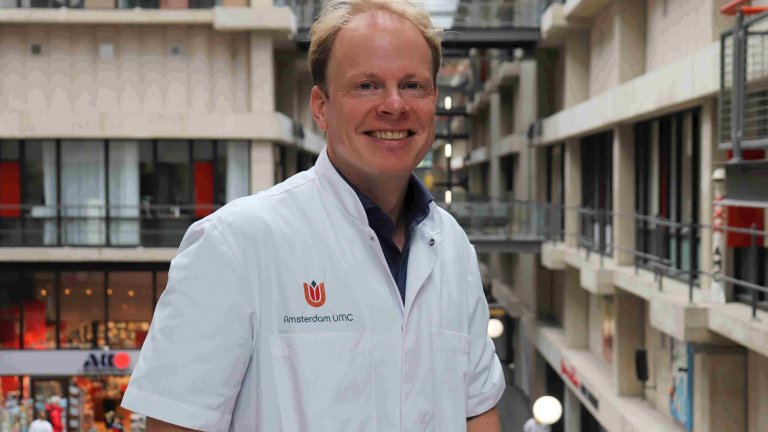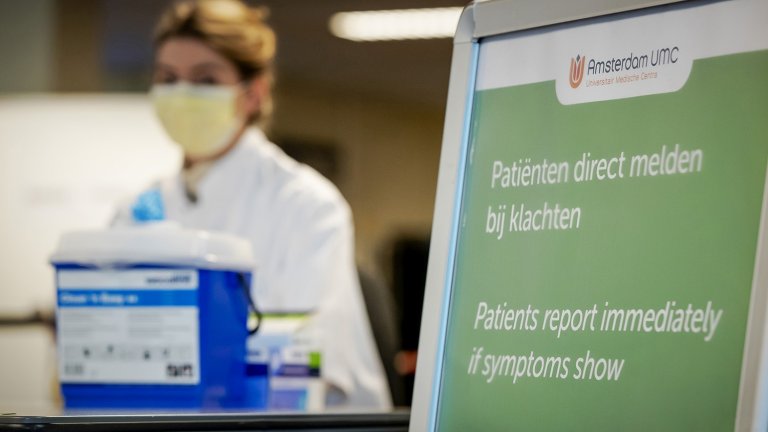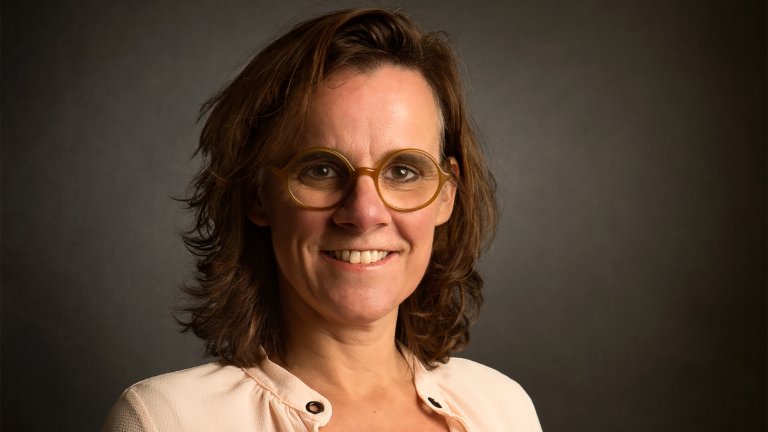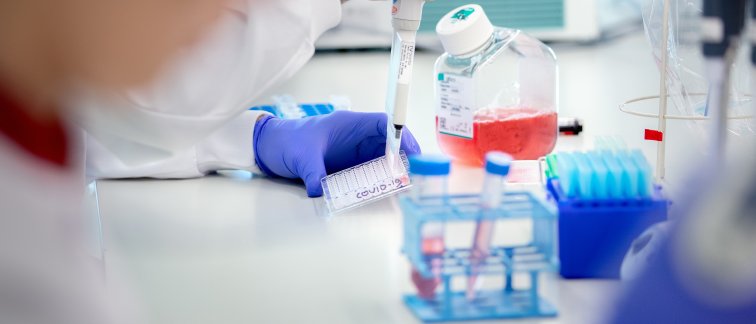‘But it was fine in the end’, says Wiersinga, putting the task into perspective. ‘Until the beginning of the year I was doing a lot of research into sepsis and pneumonia anyway, and those are two major features of COVID-19. So I was able to gauge the value of a good deal of the available literature fairly quickly with the help of my co-authors. The copycats and unsatisfactory treatment studies without control groups were soon rejected.’

Bestseller
The article that Wiersinga et al. published in the July issue of JAMA can now justifiably be labeled a bestseller. By the end of October the online paper had notched up just under 700,000 readers. ‘But it’s already out of date now: we 'only' looked at 25,000 articles for our review. Meanwhile over 65,000 articles on COVID-19 have been published, so we're working on a update. The general thrust of our review is still rock-solid, for that matter. By July it was already crystal clear that COVID-19 is definitely not just a severe viral pneumonia.’
The general thrust of our review is still rock-solid. By July it was already crystal clear that COVID-19 is definitely not just a severe viral pneumonia.
A number of articles about drugs already emerged from the review. The most striking finding was from the UK, where they had found that the existing drug dexamethasone is effective in patients. ‘It’s the only drug that reduces mortality – and an existing drug that costs hardly anything.’ And the conclusion that the antimalarial chloroquine should not be used to treat coronavirus turns out to be correct. ‘Important data will certainly be added in the coming weeks and months on the various vaccine trials.’
Separating the wheat from the chaff
An important lesson we have learned from Wiersinga’s review is that there’s a good deal of chaff amongst the wheat. ‘In their efforts not to miss anything, some journals have occasionally lowered their standards a bit too far. At the same time I have to say that the peer review of our article was still pretty rigorous and useful. It’s by no means the case that you can get anything published in a time of pandemic. In spite of the occasional blunders and even cases of fraud that have been widely reported in the press, I think this pandemic shows that the self-cleansing power of science is working quite well’, argues Wiersinga.

Central Task Force
In order to avoid useless repetitions of studies or other inefficient use of people and resources, Amsterdam UMC set up a COVID-19 Task Force at an early stage of the pandemic. A central working group manages five different expert groups, which in turn contain representatives of all eight of Amsterdam UMC’s research institutes, from ‘brains’ to ‘public health’. ‘If COVID-19 has shown us anything’, says Wiersinga, ‘it’s that collaboration and multidisciplinary partnerships are the only way to make progress. That’s precisely what the Task Force is there for.’
One of the central Task Force’s five expert groups is looking at issues relating to imaging and data use. ‘So far, some hundreds of COVID patients have been treated at Amsterdam UMC’, says Brenda Penninx, Professor of Psychiatric Epidemiology and chair of the Data & Imaging Expert Group. ‘From a scientific point of view, of course, it’s far more useful to analyze data from the many thousands of patients who have been treated at all the Dutch hospitals. We’ve now organized the pooling of data under neurologist Martijn Beudel and intensivist Paul Elbers, in the covidpredict.nl project. Over a third of the 75 Dutch ICUs have already supplied data for the project.’
Drug trials and biobank
‘Good studies have been launched in the area of treatment too’, adds Wiersinga. ‘Ideas for even more new trials are coming in every week. If we were to launch all of them, no-one would achieve the required patient numbers to do worthwhile research, so it’s good that the Task Force is playing a coordinating role there too.’ Wiersinga is enthusiastic, for instance, about a study into the immune-modulating drug imatinib in the Counter-COVID Trial, led by respiratory physician Harm Jan Bogaard. ‘It’s not only a very well conducted, randomized, and controlled study. The run-up was also smooth, with lightning-fast assessment by the medical ethics committees of the participating centers. The drug will be tested in a Phase 3 trial very soon.’
The COVID biobank has proved very useful to the study. The unusual feature is that materials have been collected from patients systematically, at various times, and that has already contributed to interesting articles.
In addition to valuable information, the various scientists – at Amsterdam UMC and elsewhere – have meanwhile collected bodily substances such as blood and urine from COVID-19 patients. Wiersinga comments: ‘The COVID biobank has proved very useful to the study. The unusual feature is that materials have been collected from patients systematically, at various times, and that has already contributed to interesting articles.’
Bond with society
Some of the scientific work related to the COVID-19 biobank has been made possible thanks to contributions by Amsterdam UMC’s Corona Research Fund. Wiersinga explains: ‘The money collected has been a major catalyst for various projects, enabling research to get under way sooner without endless grant applications. Moreover, the money, which has been collected entirely through crowd funding, creates an important bond with society. We can show that this is what people are giving money for, and this is what we scientists can do with it!’
A good deal of research – much of it outside Amsterdam UMC – is also taking place into public health, says Psychiatry Professor Penninx. ‘There are a lot of cohort studies in progress at Amsterdam UMC, some of them in the area of psychiatry. By using that infrastructure with 1,500 psychiatric patients involved and asking people to take part in research again, we have been able to show that there was no widespread deterioration in the problems suffered by psychiatric patients during the first wave in the spring, as had been generally feared. We did find a wide range, however, from people who maybe found it a bit ‘quiet’ having to self-isolate to people who had markedly more problems as a result of the restrictions. The study will of course continue, to find out what effect the second wave is having. Is the resurgence of the virus now having more impact on patients’ stability?’

Partnership is here to stay
Penninx is very hopeful that the scientific collaboration will not cease in the more distant future, when the COVID-19 chapter can hopefully be relegated to the history books. ‘Everyone realizes the great added value of pooling forces. And a lot of practical hurdles have already been overcome. Agreements have been reached on data sharing, so why would we chuck them in the bin? At times of crisis, everyone likes to focus on the positive aspects of what is a predominantly negative situation. The improvement in scientific collaboration is undoubtedly one of those positive aspects!’
Unorthodox Teams
A cyber symposium was held on diversity in COVID research on 3 December. Entitled ‘Unorthodox Teams’, it brought together a variety of researchers, from nurses to clinicians and from virologists to rehabilitation specialists, who presented their research findings.

